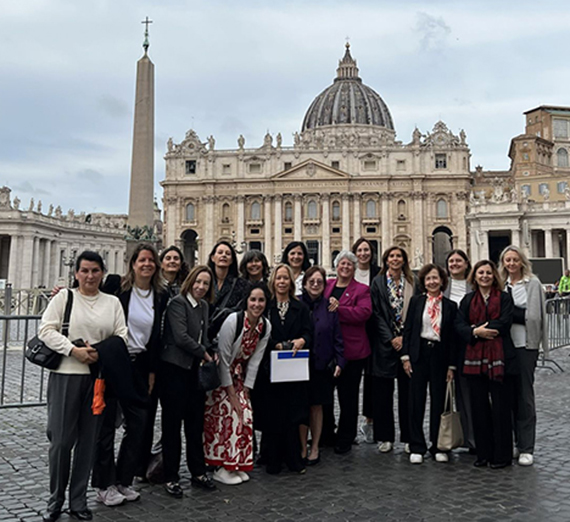President Passerini Joins Catholic Higher Ed Women Leaders in Rome to Prepare for the Future

In October 2025, on the occasion of the Jubilee Education Week, Rome became the crossroads where women leaders from Catholic universities around the world, including Gonzaga University President Katia Passerini, gathered to reflect, learn, and strengthen their shared mission.
This IFCU Women Leadership Program brought together presidents, vice-rectors, and directors from 12 countries, forming a diverse and deeply committed cohort representing Latin America, North America, Europe, and the Asia-Pacific region.
Over the course of five days, the program created a space where leadership was understood not only as responsibility, but as vocation. The opening session, featuring Passerini; Donna Carroll (president of the Association of Catholic Colleges and Universities); Isabel Capeloa Gil (former IFCU president and rector/president at Universidade Católica Portuguesa); and Lara Karam Boustany (professor of law and former president of La Sagesse University in Beirut, Lebanon), set the tone: Catholic higher education stands at a pivotal moment, and women leaders are essential to shaping its future.
Across the week, participants engaged with distinguished speakers on themes at the heart of institutional leadership today.
University of the Sacred Heart, Italy, Rector Elena Beccalli led a compelling reflection on values-based leadership, while Antonella Sciarrone Alibrandi (of the Italian Constitutional Court) invited the group into a spirited exchange on leadership models and styles in complex environments. Sessions on crisis leadership, strategic foresight, and succession planning, enriched by global voices from Portugal, Japan, Brazil, and the United States, broadened horizons and grounded discussions in lived institutional realities.
Moments of global perspective surfaced repeatedly. Sessions on crisis leadership with Ambassador Maria Amélia Maio De Paiva and innovation leader Deborah Wince-Smith challenged participants to consider how crises, whether geopolitical, financial, or cultural, can serve as catalysts for more resilient and purpose-driven institutions. Equally compelling was the forward-looking conversation on strategic foresight, led by Pamela Gillies, vice-chancellor of Glasgow Caledonian University, and Miki Sugimura, president of Sophia University, Japan, which asked what Catholic universities must become to serve future generations and respond to emerging societal needs.
And as a highlight, Sister Raffaella Petrini, president of the Pontifical Commission and Governorate of Vatican City State, joined the group to share key sustainability projects and other initiatives underway under her jurisdiction at the Holy See. You can read an excerpt from her speech here.
Not all learning took place behind a lectern at LUMSA University. Visits to various historical places enriched the conversation, including a contemplative conversation with artist Sidival Fila, whose work is displayed at the Vatican Museums. They were followed by masses at the historic Church of the Gesù (adjacent to the original rooms of St. Ignatius and the early Jesuit residence) and St. Peter’s Basilica. Finally, the Jubilee Audience with Pope Leo XIV grounded the program in the spiritual tradition that binds Catholic higher education across continents. These moments offered space for reflection, quiet intervals where the weight and privilege of serving our universities could be shared, in community.
By the time the program concluded, the group that had arrived as individuals departed as a network, an alliance of women committed to stewarding Catholic universities with wisdom, courage, and hope. The Women Leadership Program did more than convene leaders; it created space for discernment, renewal, and the kind of shared vision that can shape the future of global Catholic higher education.
